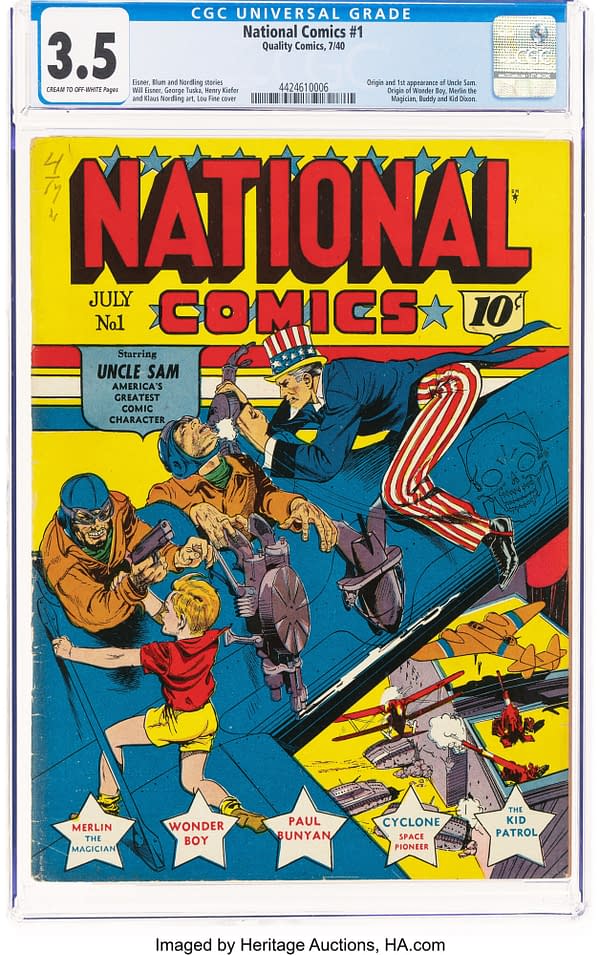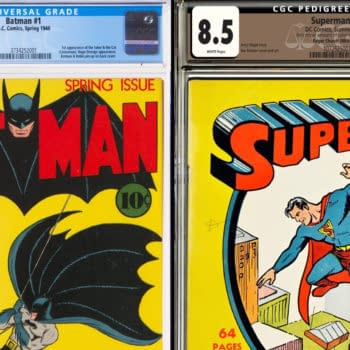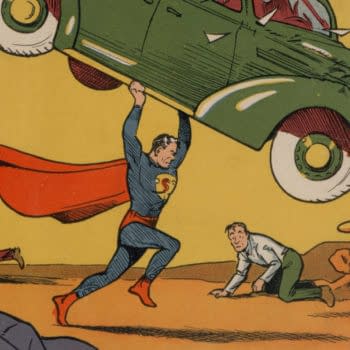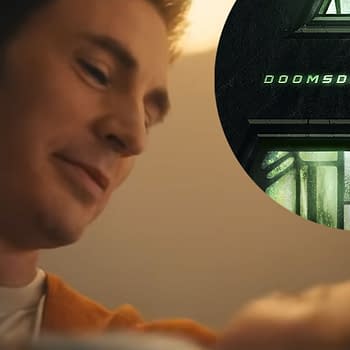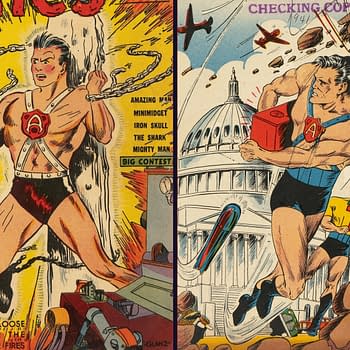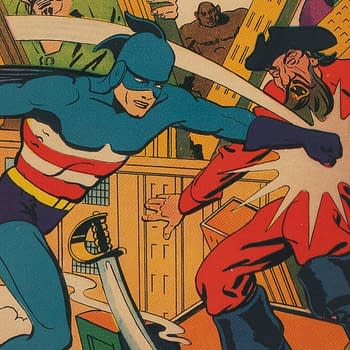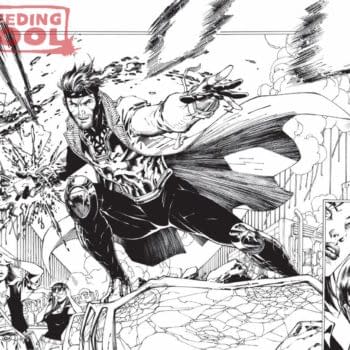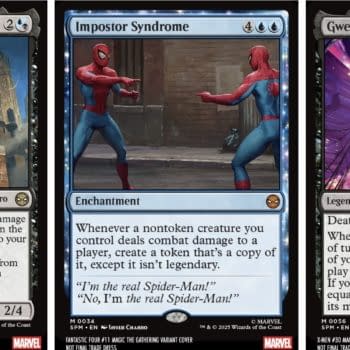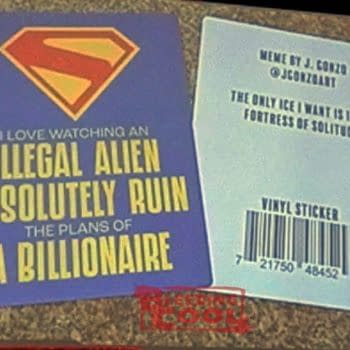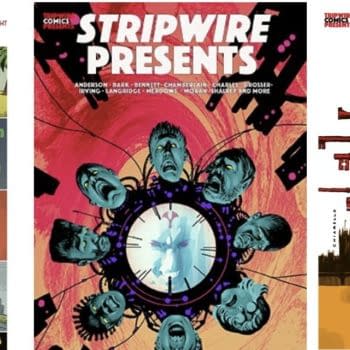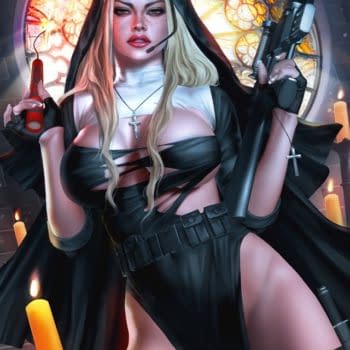Posted in: Comics, Heritage Sponsored, Vintage Paper | Tagged: lou fine, National Comics, quality comics, uncle sam, will eisner
Uncle Sam as Superhero in National Comics #1, up for Auction
American icon Uncle Sam became a comic book superhero in Quality Comics title National Comics, adapted for this purpose by Will Eisner.
Article Summary
- Uncle Sam debuted as a comic book superhero in National Comics #1 by Will Eisner and Lou Fine in 1940.
- The story draws on 1940s American politics, featuring villains inspired by real-life fascist groups.
- National Comics #1 explores themes like isolationism, political threats, and the plight of working class Americans.
- Uncle Sam symbolizes protection for Americans, blending iconic art with complex, timely storytelling.
The origin of American national icon Uncle Sam is more mysterious than one might believe. There were theories about the origin of the name as a personification of the U.S. government as early as 1816. But such origin stories changed with the times. Fifteen years later, a completely different explanation of the name made the rounds, and these were certainly not the only theories. It's unlikely that the 1830 era version of the matter is correct — even though it has largely come to be the accepted history in recent decades. I've dabbled a bit in this research myself, and think it has the earmarks of a solvable problem as more historical publications and documents become digitized. That aside, Uncle Sam has long been a figure used in cartoon and illustrative art. Legendary artists like Thomas Nast and James Montgomery Flagg have made their marks on this iconic figure, and they were far from the only ones to do so. It was inevitable that Uncle Sam would enter the comic book field as WWII approached, where he was adapted for this purpose for Quality Comics title National Comics by Will Eisner along with artists like Lou Fine and Reed Crandall among others. There's a chance to get a CGC VG- 3.5 copy of National Comics #1 (Quality, 1940) up for auction in the 2025 July 18 Golden Age Comics Century Showcase at Heritage Auctions.
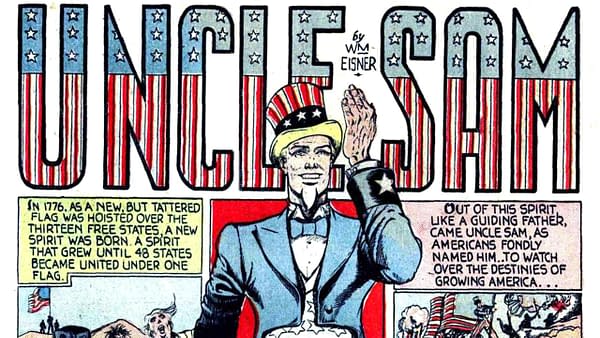
As one might expect given the title and the character, the debut Uncle Sam story in National Comics #1 is brimming with references to the politics and circumstances of its time. Most notably, the villains here called the "Purple Shirts" are clearly based on very visible American fascist organizations of that era, the Silver Shirts, or Silver Legion of America (we've discussed another use of the Silver Shirts which also called them the Purple Shirts in Wonder Woman #7 three years later) and the German American Bund with its Brownshirts. Near the beginning of the story, an agent of would-be dictator Andel Cobra, said to be funded by a "well known foreign power," makes their fascist intentions clear with statements like "Dictatorship must replace democracy! Freedom is a farce!"
The Silver Legion of America, often referred to as the Silver Shirts, was a fascist organization established in 1933 by William Dudley Pelley. The group was modeled after Adolf Hitler's Nazi movement and aimed to bring about a "spiritual and political renewal" in the US, with the Silver Shirts' uniform similar to the Nazi's brownshirts. The group was still making the news frequently by the time National Comics #1 was being written. The group was also one of the inspirations for the 1935 Sinclair Lewis dystopian political novel It Can't Happen Here.
Hitting newsstands in April 1940, National Comics #1 was released at a time when Americans overwhelmingly wanted England and France to win the war, but also strongly opposed direct American military intervention, according to Gallup polling. Like many other comic book stories of this specific time frame, this Uncle Sam story in National Comics #1 makes a tacit argument that isolationism was not a viable defense by focusing on dangers on American soil. In June 1940, France had surrendered to Germany, and by September, public sentiment in America had shifted significantly in favor of intervention.
The plight of the American working class was another theme of Eisner's Uncle Sam story in National Comics #1, and this was a subject he would regularly return to in his work during the Golden Age. In this issue, Andel Cobra's agents attempt to exploit the desperation of Dust Bowl-era farmers. The Uncle Sam story in National Comics #2 appears to be based on issues surrounding the 1938 passage of the Food and Drugs and Cosmetics Act after a bitter political battle of several years. Taken as a whole, National Comics symbolically presents Uncle Sam as a protector of the American people on a number of fronts. The series has a fascinating take on the issues of its time, presented in a dynamic, entertaining, and surprisingly sophisticated way. A title debut that lives up to its name and featured character, there's a chance to get a CGC VG- 3.5 copy of National Comics #1 (Quality, 1940) up for auction in the 2025 July 18 Golden Age Comics Century Showcase at Heritage Auctions.
